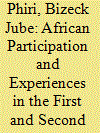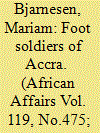| Srl | Item |
| 1 |
ID:
183672


|
|
|
|
|
| Summary/Abstract |
Unlike existing studies that examined each of the two World Wars and Africans separately, this study explores African participation and experiences in the First and Second World Wars in Northern Rhodesia (colonial Zambia) together during the period, 1914–1948. A lot has been written on the history of the World Wars in colonial Africa. However, there is not much literature that focuses on African participation and experiences during the two world wars. This study is focused on the core theme, that is, the role played by Africans in both World Wars. This is the main theme that informs the study. The core theme is sub-divided into the following three sub-themes: the making of the Northern Rhodesia Police under the British South African Company, BSACo, a Chartered Company that prohibited by law from housing a standing; recruitment of personnel for the Northern Rhodesia Regiment; the role played by traditional authorities in the recruitment of ‘Askari’ – the Foot Soldiers and the ‘Tenga-Tenga’ War Carriers and the role of government propaganda while bringing to the fore African agency during both Wars. Also discussed in the study is the demobilisation process in which African servicemen – the Foot Soldiers and the ‘Tenga-Tenga’ War Carriers – felt cheated by an Empire-wide system of racial discrimination and hierarchy. Although an expanded government propaganda machinery contributed to the growth of an African political voice in Northern Rhodesia during the period, 1914–1948, that political voice neither included nor translated to much debate or discussion about the concerns of African ex-servicemen and their personal affairs. The study equally examines how their state of affairs affected the relationship between the ex-servicemen and their traditional leaders who were active in the recruitment process that brought them into the Wars in the first place. The study concludes with the re-examination of the older arguments that African servicemen did not play an active role in nationalist politics after the World Wars, and submits otherwise, that is, that they actually did.
|
|
|
|
|
|
|
|
|
|
|
|
|
|
|
|
| 2 |
ID:
106604


|
|
|
|
|
| Publication |
2011.
|
| Summary/Abstract |
This article sheds light on the identity and activities of foreign fighters who were active in Afghanistan and Pakistan between 2002 and 2006. This is done through analyzing a series of "martyr biographies"-short biographical stories of killed militants-issued by the Al Qaeda network in 2008. The study argues that there was little migration of foreign fighters from abroad to Afghanistan and Pakistan in this period, and practically no influx of fighters from Iraq. Al Qaeda's activities in the region were upheld by fighters who managed to flee from Afghanistan during and after the U.S.-led invasion in late 2001. After re-settling in the tribal areas of Pakistan, the main concern for these fighters was to fight a guerrilla war against U.S. and NATO troops in Afghanistan, not to plot terrorist attacks in Western countries. The study demonstrates that over time, the foreign fighters became more integrated in local communities. These early developments may help to explain why Al Qaeda continues to enjoy a strong sanctuary in the tribal areas of Pakistan today.
|
|
|
|
|
|
|
|
|
|
|
|
|
|
|
|
| 3 |
ID:
172582


|
|
|
|
|
| Summary/Abstract |
On 31 January 2019, masked men wearing national security apparel allegedly stormed the residence of the National Democratic Congress (NDC) candidate Delali Kwasi Brempong and opened fired on NDC party activists gathering for the by-elections in the Ayawaso West Wuogon electoral district in Ghana’s capital, Accra. The shooting occurred not far from the La Bawaleshie polling station and spread panic among those assembled there to cast their votes. Six persons were officially confirmed injured by gunshots as the masked men were reported to have fired indiscriminately among party activists.1 Videos of the tumultuous election-day scenes went viral: masked men, armed and in uniform, bullet holes, blood-stained walls, and wounded civilians. Frustrated NDC activists and party members were filmed accusing the government of orchestrating the attack as critically injured persons were rushed to the hospital.2 Later in the day, the police assured the public that calm had been restored to the area. Voters and residents of the constituency were encouraged to remain calm and to go about their duties freely and without fear.3 But the reassuring words of the police rang empty for many Ghanaians: with a by-election in the capital turned deadly, and a general election to come only a year later, the Ghanaian electorate seemed to have all the reasons to be fearful.
|
|
|
|
|
|
|
|
|
|
|
|
|
|
|
|